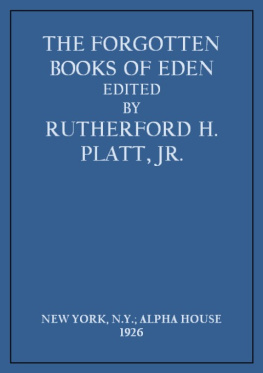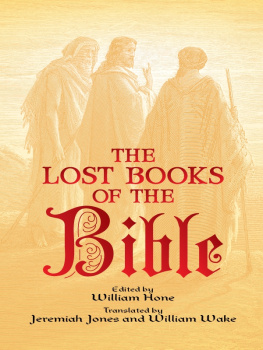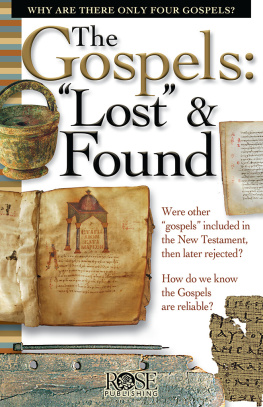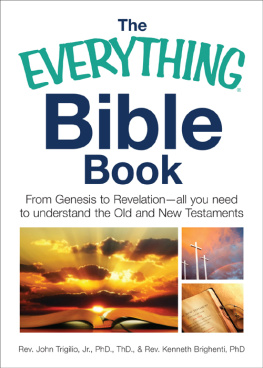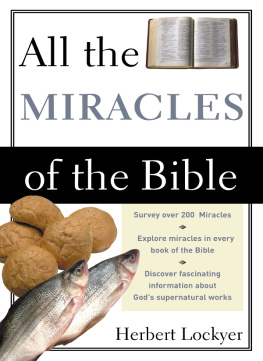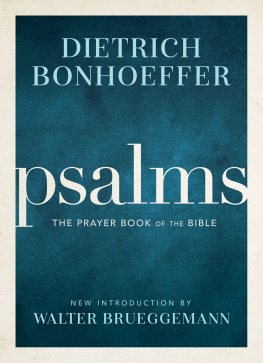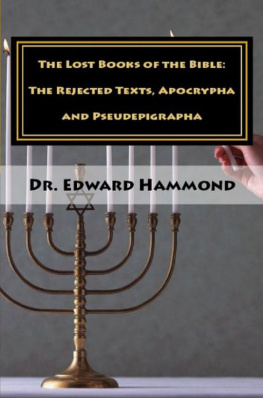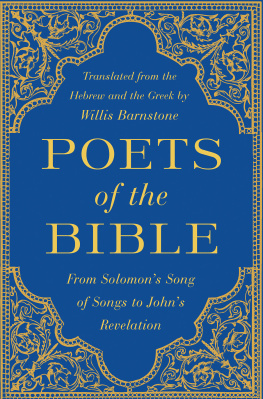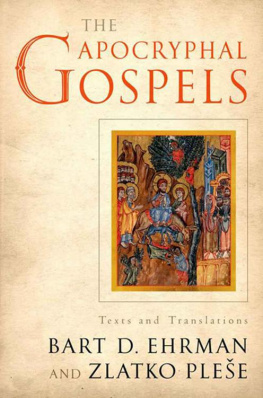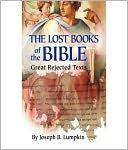
The Forgotten Books of Eden Edited By Rutherford H. Platt, Jr
Preface
TODAY the medley of outward life has made a perplexity of inward life. We moderns have ruffled our old incertitudes to an absurd point--incertitudes that are older than theology.
Not without justification have priests mounted altars for generations and cried, "Oh my soul, why dost thou trouble me?"
We are active, restless both in body and mind. Curiosity has replaced blind faith. We go groping, peering, searching, scornful of dogmas, back, further back to sources. And just as the physicist thrills at the universes he discovers as he works inward in the quest of his electrons, so the average man exults in his apprehension of fundamentals of psychology. New cults spring up, attesting to the Truth--as they see it--countless fleets of Theism, Buchmanism, Theosophy, Bahai'ism, etc., sail under brightly colored flags; and Atheism is flaunting itself on the horizon.
Almost the passengers have turned pilots. Everyman is thinking for himself.
The findings here--in this strange volume--bring the reader into a large inland sea, cut off from the traffic and the tempest that have sprung up in the West; and untouched by the crosscurrents of dogmas and presumptions that have cluttered historic centuries. Here is virgin water that gushes, troubled by abysmal forces only, out of the very earth itself.
Whence are these writings--these emotions--these profound pages of wisdom? You might as well inquire, whence is human nature? The fact is--they are. It isn't as though you can compare this literature with any other, as you might compare the French Romanticists with the Russian school. If you do so, this man may say it is too fantastic; that man, it is too coarse; the other man, it is too "out of date"! And they straightway lose all sight of the fact that it is simply fundamental.
To be sure scholars will argue, and inquire. They would find the exact history; the shape of this or that Greek stem; they would set the opinion of this erudite authority against the opinion of that. It is right that they, as scholars, should do so. It is right that the average man who is not a scholar should also do so-if he wants to; and should not have to do so, if he does not want to.
It is, however, only just to pay a tribute to scholarship which has preceded and made possible this book. The publishers are indispensably indebted to The Apocrypha and Pseudepigrapha edited by R. H. Charles, D. Litt., D. D.; The Odes and Psalms of Solomon by Dr. Rendel Harris; The Book of Adam and Eve by the Rev. S. C. Malan, D. D., published in England in 1882.
* * * *
It is appropriate to leave this book in your hands with the invocation of San Peladan, which Conrad has translated for us. San Pelandan believed in astrology, spirits of the air, elves, nymphs and everything that is deliciously fantastic. However, he did say:
"O Nature, indulgent Mother, forgive! Open your arms to the son, prodigal and weary.
"I have attempted to tear asunder the veil you have hung to conceal from us the pain of life, and I have been wounded by the mystery.... dipus, half way to finding the word of the enigma, young Faust, regretting already the simple life, the life of the heart, I come back to you repentant, reconciled, O gentle deceiver!"
* * * *
Adam and Eve; Solomon; Pharaoh; Aristeas; Ahikar; and the Twelve Intellectual Giants--we come back to you.
R. H. P. JR.
New York, August I, 1927.

The Forgotten Books of Eden Edited By Rutherford H. Platt, Jr
Introduction To The Forgotten Books Of Eden
By WILLIAM N. GUTHRIE, D.D.
Rector of St. Mark's-in-the-Bouwerie.
AN American Indian's Song is his very own. No other man can sing it without his explicit permission. It is impregnate with his aura. It is not in our sense, however, property. It is believed to invest magically the singer with the mood whence it proceeded, and must, therefore, merge in some way the performer's identity with that of the originator's. To sing another's song is an invasion of his personality, a sort of spiritual piracy involving sacrilege.
When last year in Arcady and Andritzena, I induced primitive shepherds to sing and play for me lustily all sorts of occasional songs and rituals, they refused to do a burial chant, most positively. For to perform one would surely cause a death in the house.
A little reflection on these two paragraphs may perhaps, make the reader realize that authorship was once a thing of great hazards. If one had something great and new to say, and wanted it to circulate widely, one would naturally prefer anonymity.
Indeed, by the Hebrews a story was popularly presumed to have its hero for its author. Moses wrote the account of his own death. Deuteronomy was of course, his own work, although obviously intended to alter the traditional religion. Jonah wrote the little novel about himself. David was the author of the Psalms because reported to have instituted the first temple choir, and as a lad to have played the harp soothing the nerves of King Saul. When an author for the book of Job was wanted, though the whole discussion of the work proves it was written to refute the Wisdom literature which by tradition began with the Proverbs of Solomon, Moses was chosen as a suitable author!
So for centuries among the Jews, writers sought to shelter themselves behind the names of the great dead. In this they were guilty of no fraud. They imagined what Solomon or Enoch would say, or sing, upon a particular theme under given circumstances. It was not really they themselves, but their Solomon, their Enoch, Solomon or Enoch in them, who uttered the new prophesies or temple praises.
Thus arose that body of literature, called by modern scholars, "Pseudepigrapha," that is, writings erroneously, unhistorically, and yet sincerely, ascribed to heroic figures summed from the vasty deep by a self-denying imagination, eager to alter man's belief and custom, to interpret his hope and sorrow, without personal gain or fame, and also, may one add, without the deterrent of persecution to arrest free utterance!
Now it is a foolish modern prejudice against an ancient piece of literature that its author veiled his person in this fashion. The only question is: Was the writing of inherent value? Did it exercise influence?
It is not too much to say that no modern can intelligently understand the New Testament, unless he is acquainted with the so-called "Apocrypha," and with the "Pseudepigrapha" as well. The very words of Jesus were in many instances, suggested by sayings current in his day, more or less as unconscious quotations from the Testaments of the 12 Patriarchs.
The figure of the Messiah which Jesus adapted to his creative purpose, cannot be imagined by a modern without a perusal of the book of Enoch which is its classic and most entrancing glorification. Without the Odes and Songs of Solomon the atmosphere breathed by the earliest church cannot be divined.
Hitherto access to this literature has been confined to technical scholars. Its assembly would require special information and considerable expenditure. With this enterprise of the Alpha House, Inc., it becomes democratic property. We shall have a more intelligent clergy and laity, when this volume has taken its place in every library, and is familiarly brought into every discussion of the historic Christ and of His times.
Next page
